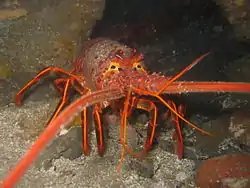Callimedon
Callimedon (Ancient Greek: Καλλιμέδων) was an orator and politician at Athens during the 4th century BCE who was a member of the pro-Macedonian faction in the city. None of his speeches survive, but details of his involvement in the controversies of his age are preserved by Dinarchus and Plutarch. He is described as brash and antidemocratic,[1] and was surnamed ὁ Κάραβος (ho Kárabos)—"The Crayfish," "Crab" or, more likely, "Spiny Lobster"[2]—because, according to Athenaeus, he was very fond of the food.[3] Callimedon is best known today for the ridicule he was subjected to on the comic stage, where he was mocked for his gluttony and strabismus.[3][4]

Life and politics
The year of his birth is unknown, but Callimedon was probably born during the first quarter of the 4th century BCE since he is named as a contemporary of Demosthenes by Athenaeus.[3] He has been identified with a man called "Callimedon of Collytus, son of Callicrates," on a late fourth-century Attic inscription recording the lease of a mine.[5] Nothing further is known of this Callicrates, but Callimedon's family appears to have been an influential and aristocratic one from Collytus,[6] an Athenian neighbourhood south of the Acropolis.
Callimedon's grandfather Agyrrhius had been a prominent (and pro-democratic) politician in the early fourth-century and was appointed strategos in 389.[7] As a member of an elite family, Callimedon had access to the upper rungs of the Athenian social ladder and he appears to have been regarded as something of a local celebrity and raconteur. He was a member of the dining club known as "the Sixty" which met in the Heracleion at Diomeia[8] and whose collective wit was so famous that Philip II of Macedon was said to have paid the group a talent to send him a collection of their jokes.[9]
Dinarchus reports that Demosthenes attempted to prosecute Callimedon in 324 BCE for conspiring with Athenian exiles in Megara to replace the democracy with an oligarchy under Macedonian control.[10]
Following the death of Alexander in 323 BCE, the democratic interests in the Greek cities once again attempted to unite against Macedon, and Callimedon together with Pytheas (Athenian) fled Athens for the camp of Antipater.[11]
References
- Plutarch, Phocion 27.5.
- The epithet when applied to Callimedon is traditionally translated as "Crayfish" or "Crab", but "spiny lobster" is now the accepted meaning of the word; cf. Thompson 1957, pp. 102–3.
- Athenaeus, Deipnosophistae 3.104c–d.
- Ath. 8.337b.
- Inscriptiones Graecae II2 1587; cf. Kirchner 1901, p. 534 (no. 8032).
- Bradeen 1974, p. 60 (no. 187).
- Xenophon, Hellenica 4.8.31, Bayliss 2011, p. 107.
- A demos at the southeast of the city-wall; cf. Heracleia.
- Ath. 14.614d: "They were gathered at the Temple of Heracles in Diomeia, sixty in number, and in the city they were referred to in phrases like "The Sixty said this," and, "I've just come from the Sixty". Among them were Callimedon the Crayfish and Deinias, as well as Mnasigeiton and Menaechmus, as Telephanes says in his On the Town. Their reputation for amusement was so great that, upon hearing of it, Philip of Macedon sent them a talant so that they might write down their jokes and send them to him." (ἐν γοῦν τῷ Διομέων Ἡρακλείῳ συνελέγοντο ξʹ ὄντες τὸν ἀριθμὸν καὶ ἐν τῇ πόλει διωνομάζοντο ὡς "οἱ ξʹ τοῦτ' εἶπον" καὶ "ἀπὸ τῶν ξʹ ἔρχομαι." ἐν δὲ τούτοις ἦσαν Καλλιμέδων τε ὁ Κάραβος καὶ Δεινίας, ἔτι τε Μνασιγείτων καὶ Μέναιχμος, ὥς φησι Τηλεφάνης ἐν τῷ περὶ τοῦ Ἄστεος. τοσαύτη δ' αὐτῶν δόξα τῆς ῥᾳθυμίας ἐγένετο ὡς καὶ Φίλιππον ἀκούσαντα τὸν Μακεδόνα πέμψαι αὐτοῖς τάλαντον, ἵν' ἐκγραφόμενοι τὰ γελοῖα πέμπωσιν αὐτῷ.)
- Dinarchus, In Demosthenem 94.
- Plut. Demosthenes 27.1–2.
Bibliography
- Bayliss, A.J. (2011), After Demosthenes: The Politics of Early Hellenistic Athens, London, ISBN 978-1-4411-1151-7
{{citation}}: CS1 maint: location missing publisher (link). - Bradeen, D.W. (1974), The Athenian Agora, Volume XVII. Inscriptions: The Funerary Monuments, Princeton
{{citation}}: CS1 maint: location missing publisher (link). - Hunter, R.L. (1983), Eubulus: The Fragments, Cambridge, ISBN 978-0-521-24436-7
{{citation}}: CS1 maint: location missing publisher (link). - Kirchner, J. (1901), Prosopographia Attica, vol. i, Berlin
{{citation}}: CS1 maint: location missing publisher (link). - Thompson, D.W. (1957), A Glossary of Greek Fishes, London
{{citation}}: CS1 maint: location missing publisher (link). - Webster, T.B.L. (1953), Studies in Later Greek Comedy, Manchester
{{citation}}: CS1 maint: location missing publisher (link).